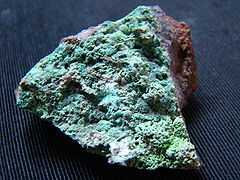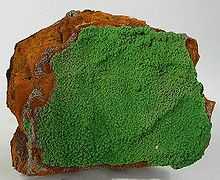Conichalcite
| Conichalcite | |
|---|---|
 A thin crust of conichalcite on a rock. | |
| General | |
| Category | Arsenate minerals |
| Formula (repeating unit) | CaCu(AsO4)(OH) |
| Strunz classification | 08.BH.35 |
| Dana classification | 41.5.1.2 |
| Crystal symmetry | Orthorhombic (2 2 2) - disphenoidal |
| Unit cell | a = 7.39(1) Å, b = 9.23(1) Å, c = 5.83(1) Å; V 397.66 ų; Z = 4 |
| Identification | |
| Color | Grass-green to yellowish green, pistachio-green, emerald-green; may be zoned |
| Crystal habit | Crusts of acicular to almost fibrous crystals. Also as botryoidal masses and compact crusts. |
| Crystal system | Orthorhombic |
| Twinning | Rare on {001} |
| Cleavage | Absent |
| Fracture | Uneven |
| Tenacity | Brittle |
| Mohs scale hardness | 4.5 |
| Luster | Vitreous, greasy |
| Streak | Green |
| Diaphaneity | Translucent |
| Specific gravity | 4.3 |
| Optical properties | Biaxial (+/-) |
| Refractive index | nα = 1.778 - 1.800 nβ = 1.795 - 1.831 nγ = 1.801 - 1.846 |
| Birefringence | δ = 0.023 - 0.046 |
| Pleochroism | Visible |
| Dispersion | Strong r < v to r < v moderate |
| References | [1][2] |
Conichalcite, CaCu(AsO4)(OH), is a relatively common arsenate mineral related to duftite (PbCu(AsO4)(OH)). It is green, often botryoidal, and occurs in the oxidation zone of some metal deposits. It occurs with limonite, malachite, beudantite, adamite, cuproadamite, olivenite and smithsonite.[1][2]
Formation

Conichalcite forms in the oxidation zones of copper orebodies. Here groundwater enriched with oxygen react with copper sulfide and copper oxide to produce an array of minerals such as malachite, azurite and linarite. Conichalcite is often found encrusted on to limonitic rocks that have yellow to red colors.
Conichalcite will also form a solid solution series with the mineral calciovolborthite. When these two minerals form a solid solution series, the two interchanging elements are arsenic and vanadium. Conichalcite is the arsenic rich end member of the series and calciovolborthite is the vanadium rich end member.[1]
Notable occurrences of conichalcite include Juab Co., Utah; Lincoln and Lyon counties of Nevada and Bisbee, Arizona, in the USA; Durango, Mexico; Collahuasi, Tarapaca, Chile; Calstock, Cornwall and Caldbeck Fells, Cumbria, England; Andalusia, Spain; and Tsumeb, Namibia.[2]
References
| Wikimedia Commons has media related to Conichalcite. |